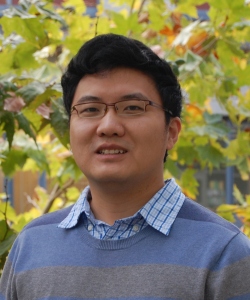Chen Qian, assistant professor of computer engineering in the Baskin School of Engineering at UC Santa Cruz, has received a Faculty Early Career Development (CAREER) Award from the National Science Foundation (NSF). The CAREER award will provide $500,000 in funding over five years.
Qian’s project, “Othello Hashing and Its Applications to Scalable and Dynamic Network Forwarding and Functions,” seeks to find high-speed, low-cost solutions for computer networks.
Today, devices of all kinds are being connected to computer networks. Computers, “smart” phones, “smart” appliances, and a myriad of other devices in a network are expected to operate efficiently and to communicate with one another.
Qian’s research is on designing new protocols and algorithms that are scalable to a very large number of computers and devices but still cost very little in the way of resources.
“There are two ways we can add large numbers of new computers to a network,” Qian said. “One way is to invest in more expensive routers and devices, which have more memory and computing power. The other way is to design better network algorithms and protocols that improve throughput and don’t rely on massive amounts of memory.”
Qian’s solution takes the latter approach and relies on a new network algorithm called “Othello Hashing,” developed by Qian and his colleagues. With Othello Hashing, Qian will investigate important network “primitives,” including load balancing, private data access, and distributed data placement.
Interestingly, Qian’s research also has applications to molecular biology and genomics. The algorithms he has developed have increased the speed of RNA sequence searches by 20 times.
The CAREER awards are the NSF’s most prestigious awards in support of early-career faculty who exemplify the role of teacher-scholars through outstanding research, excellent education, and the integration of education and research.
Qian has made key contributions in the areas of computer networks, network security and privacy, and mobile and pervasive computing. He received his Ph.D. from the University of Texas at Austin.



